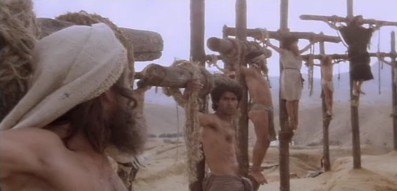 I came across an article in TimesOnline about a month ago now. It was a top twenty list of the most religiously offensive cultural moments of the last thirty or so years. The article, “The Blasphemy Collection” listed one of my personal favorites. Monty Python’s Life of Brian was there with its infamous protagonist, Brian Cohen, who, being born in the stable next to Jesus’, spends the rest of his life mistaken for the Messiah. Especially offensive in this one is the final crucifixion scene where those being executed burst into song, “Always look on the bright side of life” with Eric Idle playing the lead singer crucifee. What I didn’t realize was that this film wasn’t officially shown in some countries for years after it was made (in Ireland it took 8 years, in Italy 11 years!) because of the offence it caused to some Christian groups.
I came across an article in TimesOnline about a month ago now. It was a top twenty list of the most religiously offensive cultural moments of the last thirty or so years. The article, “The Blasphemy Collection” listed one of my personal favorites. Monty Python’s Life of Brian was there with its infamous protagonist, Brian Cohen, who, being born in the stable next to Jesus’, spends the rest of his life mistaken for the Messiah. Especially offensive in this one is the final crucifixion scene where those being executed burst into song, “Always look on the bright side of life” with Eric Idle playing the lead singer crucifee. What I didn’t realize was that this film wasn’t officially shown in some countries for years after it was made (in Ireland it took 8 years, in Italy 11 years!) because of the offence it caused to some Christian groups.
There were some other more arcane moments in this top twenty, like the artist Cosimo Cavallaro’s My Sweet Lord, a 200lb figure of the crucified Christ carved entirely out of chocolate, which was pulled from a New York art gallery after protest from the Catholic League during Holy Week earlier this year.
Now there were also some whose vulgarity even shocked me (which, I must admit, takes a bit of work), but I’ll save you from those (just follow the link, if you’d like). What I want to get at is that it’s easy to be offended when we feel as if our faith is being ridiculed, or when we feel as if the profane is encroaching too close to the sacred. It’s sort of a natural reaction. St. Paul, though, had a different idea. For St. Paul, the cross is an offence; the sacred is profaned in the reality of the cross of Jesus. Here’s Paul, writing to the congregation at Corinth:
For the message about the cross is foolishness to those who are perishing, but to us who are being saved it is the power of God…. we proclaim Christ crucified, a stumbling block to Jews and foolishness to Gentiles, but to those who are the called, both Jews and Greeks, Christ the power of God and the wisdom of God. God chose what is foolish in the world to shame the wise; God chose what is weak in the world to shame the strong; God chose what is low and despised in the world, things that are not, to reduce to nothing things that are…
It’s a bit of a cliché to say that the church has domesticated the message of the cross, but I’ll say it anyways. Imagine for a moment, if you will, that this coming Sunday, instead of a cross sitting atop the steeple of your church as you’re walking in, there was, in its place, an electric chair. Digest that for a minute. Then, when you walk inside, this common symbol of execution is all over the place, even hanging around the necks of some of the people inside. How many of you would voluntarily associate yourselves with such an offensive place and with people like this? Well, given that you’re reading this, you probably do so on a weekly basis. Maybe now you can appreciate a little better this “foolishness” the apostle is talking about.
Perhaps it takes some of our artists, poets, writers, and film makers—the best of religion’s cultured despisers—to remind us, as St. Paul reminded the believers at Corinth, that what we’re all about is, at first, second, and maybe even third glance, foolish. And why foolishness? Why does Paul use this language? Not because, it seems to me, he wanted to delight in the absurd (after all, he was a fairly reasonable person), or even because he wanted to confound conventional wisdom, but because, for Paul the God who is revealed at the cross, the God who is revealed in weakness and death, is, by all appearances, a fool (how’s that for offensive?)!
And we’re called to follow this God, this Jesus in this way, in a way that seems to be a fool’s game, at least according to the rules of this world. This crucified God is an offence. This God offends our sense of what we ought to value, of what’s up and of what’s down. Power, strength, security, and success are the goals of the game according to our pervasive culture of entitlement. But this God has changed the rules, upended our game, and has showed us, from the darkness and offence of the cross, the true bright side of life.
